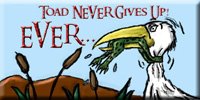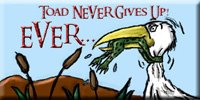
The "Laffer Curve" is commonly cited as being the model best known for illustrating tax-take "efficiency", see here: http://en.wikipedia.org/wiki/Laffer_curve
As you increase the amount of tax on an item or service, your tax-take correspondingly increases. Up to a point. As the amount of tax charged increases past a certain point, the higher charge for the item or service begins to affect sales of same. This has a detrimental effect on the tax-take until, of course, so much tax is levied that the tax-take actually decreases. The Toad is of the firm belief that in the area of alcohol and tobacco, we have been firmly on the right-hand side of the Laffer curve for many years. The irony being the consumption has remained the same.
Let's look at some historical examples. I'll quote from memory, so please excuse any inaccuracies.
Around 1780, Britain taxed tea at 119%. This meant only the rich had access to unadulterated tax-paid tea. The vast majority of tea drinkers consumed smuggled tea which was imported in great quantities compared to pukka tea. Very often this was bulked out with sawdust stained by lead and all other manner of nasty things. Crime was part and parcel of smuggling, including murder. Great profit was also part and parcel of smuggling. At the time we were short of warships to kill the French with, especially frigates. Many frigates were employed in customs work against the tea smugglers.
So, Pitt jnr says " 'old on, why don't we drop the duty on tea to 12.5%?" And so it was that the Commutation Act of 1784 at one stroke reduced the tax on tea from 119 per cent to 12.5 per cent. Result!! Crime due to tea smuggling practically disappears and revenues are soon restored and actually eclipse previous levels. The adulteration of tea with nasty colourings and sheep dung is diminished and there are more frigates to kill Frenchmen (huzzah!!). Everyone wins (apart from the French).
200 hundred-odd years later and after the example of prohibition in the States, we still don't learn our lesson. I live in Lincolnshire. If I want tax-free beer I can get it with no problem at about half of the price I would have to pay in a shop. Ditto for tobacco if I smoked. These contraband goods come via Dover as Hull is too expensive a route for the bootleggers to use. So, if someone half way up the East coast of England can make these savings, what is the deal in Kent? The deal is that the Kentish brewer Shepherd Neame export their beer to France, to be sold to British day-tourists. No revenue for Mr. Brown, decreased profits for Shepherd Neame and the nausea of the trek for the shopper. Everybody loses (apart from the French).


No comments:
Post a Comment